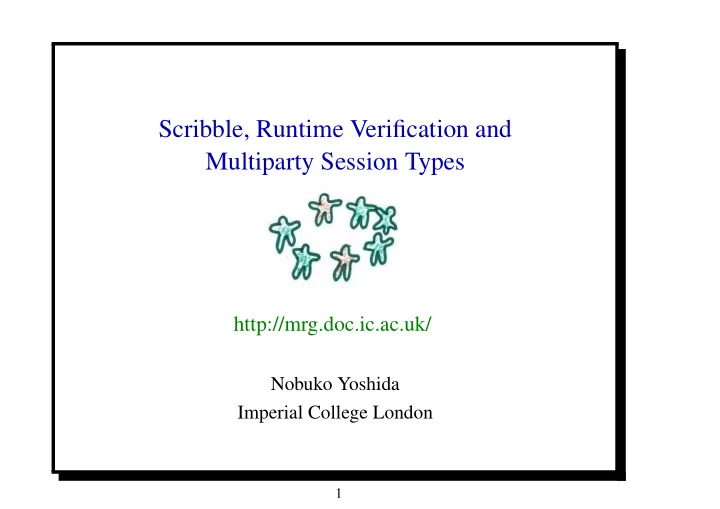

Scribble, Runtime Verification and Multiparty Session Types http://mrg.doc.ic.ac.uk/ Nobuko Yoshida Imperial College London 1
In collaboration with: Matthew Arrott (OOI) Gary Brown (Red Hat) Stephen Henrie (OOI) Bippin Makoond (Cognizant/Qualit-e) Michael Meisinger (OOI) Matthew Rawlings (ISOTC68/USB) Alexis Richardson (RabbitMQ/Pivotal) Steve Ross-Talbot (Cognizant/Qualit-e) and all our academic colleagues Laura Bocchi, Tzu-Chun Chen, Tiago Cogumbreiro, Romain Demangeon, Pierre-Malo Deniel´ ou, Juliana Franco, Luca Fossati, Dimitrios Kouzapas, Julien Lange, Rumyana Neykova, Nicholas Ng, Weizhen Yang 2
Outline ➤ Background ➤ Multiparty Session Types ➤ Scribble and Applications to a Large-scale Cyberinfrastructure ➤ Recent Works 3
Communication is Ubiquitous ➤ Internet, the WWW, Cloud Computing, the next-generation manycore chips, message-passing parallel computations, large-scale cyberinfrastructure for e-Science. ➤ The way to organise software is increasingly based on communications. ➤ Applications need structured series of communications. ➤ Question ➣ How to formally abstract/specify/implement/control communications? 4
Communication is Ubiquitous ➤ Internet, the WWW, Cloud Computing, the next-generation manycore chips, message-passing parallel computations, large-scale cyberinfrastructure for e-Science. ➤ The way to organise software is increasingly based on communications. ➤ Applications need structured series of communications. ➤ Question ➣ How to formally abstract/specify/implement/control communications? 5
Communication is Ubiquitous ➤ Internet, the WWW, Cloud Computing, the next-generation manycore chips, message-passing parallel computations, large-scale cyberinfrastructure for e-Science . ➤ The way to organise software is increasingly based on communications. ➤ Applications need structured series of communications. ➤ Question ⇒ Multiparty session type theory = ➣ How to formally abstract/specify/implement/control communications? 6
Ocean Observatories Initiative ➤ A NSF project (400M$, 5 Years) to build a cyberinfrastructure for observing oceans around US and beyond. ➤ Real-time sensor data constantly coming from both off-shore and on-shore (e.g. buoys, submarines, under-water cameras, satellites), transmitted via high-speed networks. 7
Ocean Observatories Initiative 8
Challenges ➤ The need to specify, catalogue, program, implement and manage multiparty message passing protocols . ➤ Communication assurance ➣ Correct message ordering and synchronisation ➣ Deadlock-freedom, progress and liveness ➣ Dynamic message monitoring and recovery ➣ Logical constraints on message values ➤ Shared and used over a long-term period (e.g. 30 years in OOI). 9
Why Multiparty Session Types? ➤ Robin Milner (2002): Types are the leaven of computer programming; they make it digestible . ⇒ Can describe communication protocols as types = ⇒ Can be materialised as new communications = programming languages and tool chains . ➤ Scalable automatic verifications (deadlock-freedom, safety and liveness) without state-space explosion problems ( polynomial time complexity ). ➤ Extendable to logical verifications and flexible dynamic monitoring . 10
Dialogue between Industry and Academia Binary Session Types [PARL’94, ESOP’98] ⇓ Milner, Honda and Yoshida joined W3C WS-CDL (2002) ⇓ Formalisation of W3C WS-CDL [ESOP’07] ⇓ Scribble at Technology 11
Petri-Pi Working Group led by R. Milner and W.M.P van der Aalst started in 2003
Beginning: Petri-Pi From: Robin Milner Date: Wed, February 11, 2004 1:02 pm Steve Thanks for that. I believe the pi-calculus team ought to be able to do something with it -- you seem to be taking it in that direction already. Nobuko, Kohei: I thought we ought to try to model use-cases in pi-calculus, with copious explanations in natural language, aiming at seeing how various concepts like role, transaction, .. would be modelled in pi. I am hoping to try this one when I get time; you might like to try too, and see if we agree! Robin 12
Dr Gary Brown (Pi4 Tech) in 2007
Dialogue between Industry and Academia Binary Session Types [PARL’94, ESOP’98] ⇓ Milner, Honda and Yoshida joined W3C WS-CDL (2002) ⇓ Formalisation of W3C WS-CDL [ESOP’07] ⇓ Scribble at Technology ⇓ Multiparty Session Types [POPL’08] ⇓ 13
Dialogue between Industry and Academia Binary Session Types [PARL’94, ESOP’98] ⇓ Milner, Honda and Yoshida joined W3C WS-CDL (2002) ⇓ Formalisation of W3C WS-CDL [ESOP’07] ⇓ Scribble at Technology ⇓ Multiparty Session Types [POPL’08] ⇓ 14
Session Types Overview Properties Communication safety (no communication mismatch) Communication fidelity (the communication follow the protocol) Progress (no deadlock/stuck in a session)
������������ ���� � ������ ������������� ������� ������� � ���������� ������������� ��������� � ������� �� ���������������������� ����������� ���������� ������������ ������������ � ���������� ������������� ������������������ �������� ��������� ��������� � ������������������ ������������������ ������������� ����������� � ���� ������ ��������������� ���������������� �������� � ����������� �������� ������������������������������� ��� ��������������
����������������� ���������������� ��������� ������������������������������������������������ expand the scientists’ ability to �������������� ��� ����� ������ ������������������������������������� ����������� ��������������������������� research,…
���������������������������� � ������������������������ ��������� ���������������������� �������������� ��������������� ������������ �������� � ��������������������������������� ���������� ��������� ������������ � ����������������������������� � �����������������������������������
�������������������������������������� � ����������� � ������������������ ������������������������ ���������� �������� � �������������� ����������� ����������������� � ������������������������ ���������������� � ��������������������� ���������
2-level Verification 1. Writing correct global protocols with Scribble Compiler 2. Verify programs via local monitors
2-level Verification 1. Writing correct global protocols with Scribble Compiler 2. Verify programs via local monitors
www.scribble.org
�����������������
��������� �������� �����������
Buyer: A local projection
Global protocol well-formedness 1/2 global protocol ChoiceAmbiguous(role A, role B, role C) { choice at A { m1() from A to B; // X m2() from B to C; m3() from C to A; } or { m1() from A to B; // X m5() from B to C; m6() from C to A; } } global protocol ChoiceNotCommunicated(role A, role B, role C) { choice at A { m1() from A to B; m2() from B to C; // X } or { m4() from A to B; } } 17 / 42
Recommend
More recommend